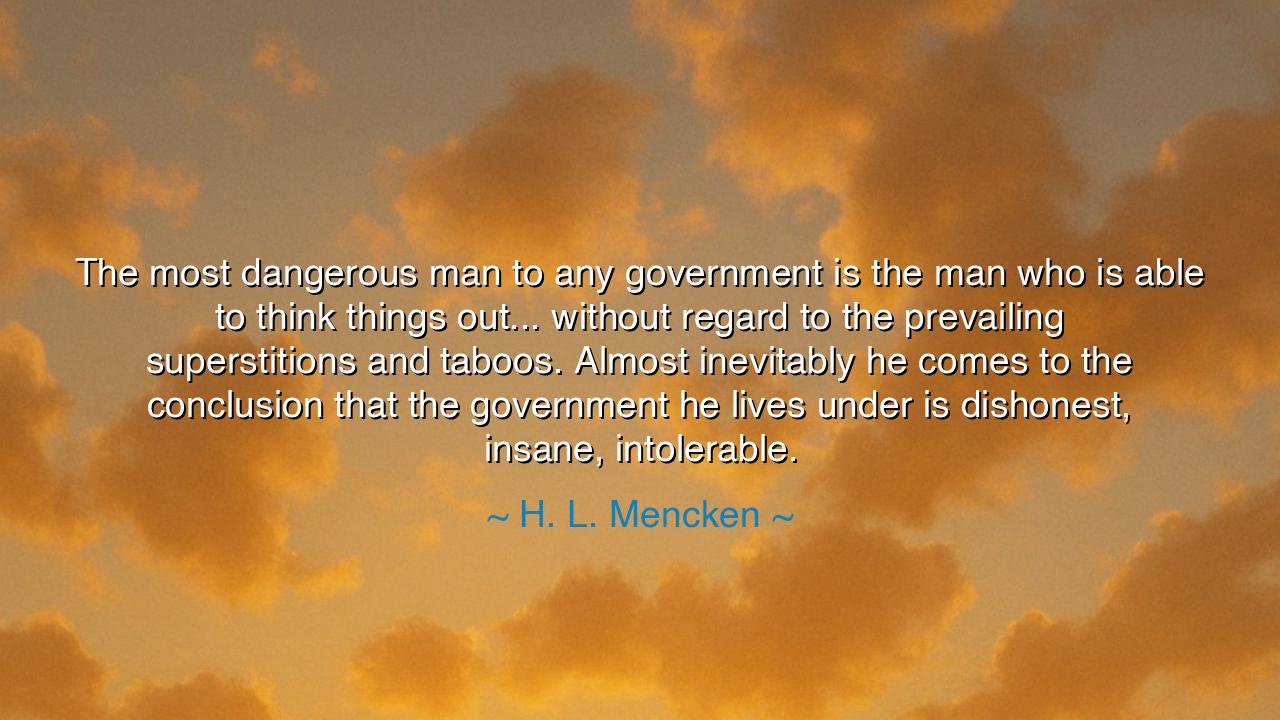
The most dangerous man to any government is the man who is able
The most dangerous man to any government is the man who is able to think things out... without regard to the prevailing superstitions and taboos. Almost inevitably he comes to the conclusion that the government he lives under is dishonest, insane, intolerable.






"The most dangerous man to any government is the man who is able to think things out... without regard to the prevailing superstitions and taboos. Almost inevitably he comes to the conclusion that the government he lives under is dishonest, insane, intolerable." – H. L. Mencken
In these sharp and unflinching words, H. L. Mencken, the great American journalist and critic, lays bare one of the eternal truths of power: that independent thought is the fiercest enemy of tyranny. When Mencken speaks of “the most dangerous man,” he does not refer to the violent revolutionary or the conspirator, but to the thinker—the one who dares to reason freely, unchained by the dogmas and fears that bind the masses. Such a man, he says, becomes “dangerous” not because he wields weapons, but because he wields truth, and truth is the one force no government of deceit can endure. His words are both a warning and a celebration—a recognition that the freedom of the mind is the first and last fortress of human liberty.
The origin of this quote lies in Mencken’s lifelong battle against hypocrisy, propaganda, and the blind worship of authority. Writing in the early 20th century, during a time of war fever, prohibition, and political corruption, Mencken witnessed how easily governments manipulate the passions and fears of the people to maintain control. He saw how superstition and taboo—be they religious, patriotic, or ideological—are used to silence dissent and sanctify lies. To think “without regard” for these social chains, Mencken argued, was the most radical act a man could perform. For once a person dares to question the sacred myths of his society, he inevitably discovers the rot beneath its institutions—the dishonesty, the madness, and the intolerance that Mencken so powerfully names.
To understand his meaning, one must look across the centuries to those who have dared to think freely, even when the world called them heretics. Socrates, who questioned the false pieties of Athens, was condemned to death for “corrupting the youth.” Galileo, who looked through his telescope and saw truth that contradicted church doctrine, was imprisoned for daring to speak what he saw. And in the modern age, countless journalists, whistleblowers, and philosophers have faced persecution for exposing the lies of governments that demanded obedience over understanding. Such men and women prove Mencken’s point: that the one who thinks freely cannot help but see that much of what passes for governance is an illusion of reason masking a machinery of control.
Mencken’s words also pierce the heart of a deeper paradox. Governments, in their highest form, claim to serve the people—but in their lowest, they fear them. And what they fear most is not rebellion, but enlightenment. A populace that questions cannot be easily ruled; a mind that thinks cannot be easily deceived. Thus, the independent thinker is branded “dangerous” not because he seeks chaos, but because he threatens to reveal that the emperor has no clothes. Every corrupt system—whether empire, dictatorship, or democracy turned rotten—survives only through the consent of the misled. The moment that veil is lifted, the structure trembles.
History itself confirms the prophetic weight of Mencken’s observation. Consider the fate of Alexander Solzhenitsyn, the Russian writer who exposed the cruelties of Stalin’s gulags. For writing what was true, he was exiled from his homeland, branded an enemy of the state. Yet his words broke through iron walls and awakened millions to the insanity of totalitarianism. Or reflect upon Martin Luther, who defied the authority of the Church by following his own conscience. His simple act of intellectual rebellion ignited a movement that changed the world. In both cases, the same law applies: the free mind is the most subversive force on earth.
Mencken’s critique is not only of government but of the human tendency toward conformity. He warns that most people, out of fear or laziness, choose comfort over clarity. They prefer the illusion of safety to the burden of thought. Thus, tyranny does not need bayonets when it has believers; it does not need prisons when the mind has already surrendered. Mencken’s “dangerous man” is therefore a moral ideal—a call to courage, urging every person to break the chains of imposed ignorance and to see the world as it is, not as they are told it must be.
The lesson, then, is clear and enduring: to be truly free, one must think freely—even when truth is costly, even when it isolates. Every age has its dogmas; every nation its sacred lies. To question them is not treason, but service to humanity. The “dangerous man” is, in truth, the guardian of civilization itself. Without such souls, progress would perish, and freedom would fade into myth.
And so, the practical actions are these: cultivate your mind as a sanctuary of truth. Read widely, question deeply, and never surrender your reason to the passions of the crowd. When the world demands belief, dare to inquire; when it demands silence, dare to speak. Do not be afraid to be called dangerous, for as H. L. Mencken reminds us, it is only the dangerous thinker who keeps the flame of liberty burning in a world too willing to trade its light for the comfort of darkness.






AAdministratorAdministrator
Welcome, honored guests. Please leave a comment, we will respond soon